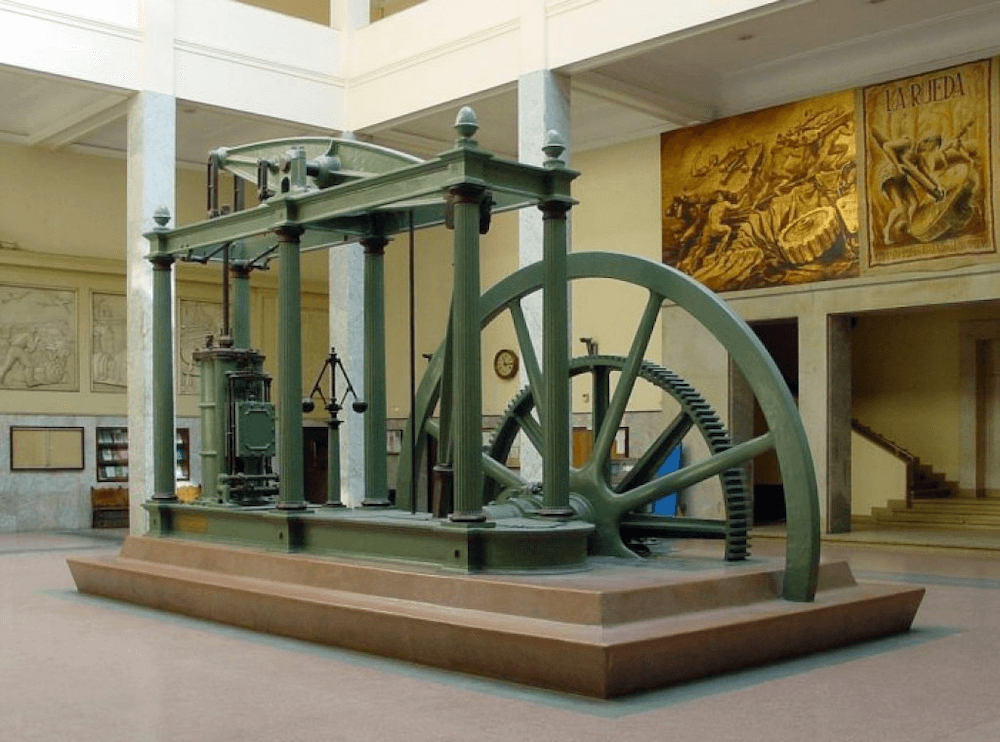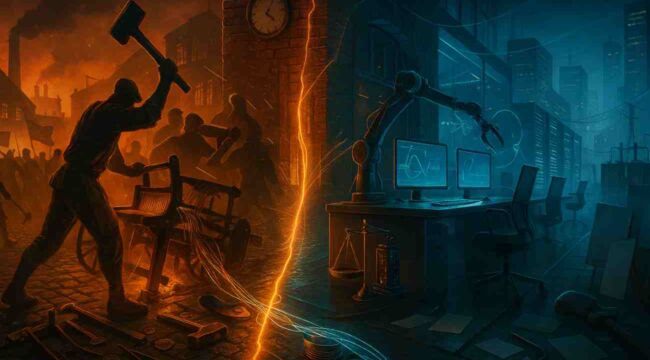Revenge of the Luddites: Part II
The Industrial Revolution was, at least initially, a British phenomenon.
It started off in the mid-1700s with a number of textile-related tech breakthroughs. The spinning jenny and the water frame made productivity in the sector soar.
Traditional weavers, spinners, and other craftspeople quickly found themselves lacking steady work.
Technological advances only sped up from there, with Watt steam engines enabling larger factories by the late 1700s.

Watt Steam Engine. Photo by Nicolás Pérez, CC BY-SA 3.0, Source: Wikimedia
Companies which adopted this new technology early seized huge portions of market share. New industrial empires were born. The cost of textiles and other now mass-manufactured goods plummeted.
But the disruption shock ran deep. Hundreds of thousands of traditional craftsmen were suddenly thrust into poverty.
Almost overnight, their services were worth a fraction of their prior value. Machines had taken over.
The lucky ones were able to get jobs in new factories. But hours were long, conditions could be brutal, and it was a very different life than running your own successful small business.
Remember the Luddites
The ensuing social unrest resulted in the development of the Luddite movement, which we discussed back in April in Consequences of the AI Disruption.
The Luddites were British citizens fed up with machines taking their livelihoods. So they rose up, attacking factories and sabotaging industrial sites.
However, their movement was ultimately doomed. Guards were set at factories, Luddite groups were arrested, executed, and in some cases, deported to the colony of Australia.
This type of civil unrest is inevitable whenever a major tech breakthrough changes the world.
Neo-Luddites
I suspect we will see our own AI-driven tech unrest in the near future. Already, AI is replacing many entry-level positions. In banking, finance, tech, and elsewhere, junior analysts and software engineers are being replaced by ChatGPT and competitors.
White-collar jobs are first on the AI chopping block. Which is interesting, because as kids, many of us were led to believe the opposite. That eventually robots would take away physically-demanding jobs, but not desk-based ones.
It’s ironic that the opposite appears to be true as we are entering this AI disruption period.
Also throwing a wrench in the job market is the fact that many corporations are replacing American workers with cheaper H1-B legal immigrants.
Many younger generations today face a tough job market, and feel little hope about ever being able to afford to have a home or family.
It’s a perfect storm for civil unrest.
Modern Solutions
AI is set to displace a significant portion of the white collar workforce over the next decade. For the individual the answer is simple, he or she should learn how to utilize these new AI tools within their field. Become a person that can get productivity from AI, and you’re much more likely to survive the transition.
On a broader social level, things get tricky. Most people will ignore AI for too long. Most companies will fall behind. Wealth inequality will soar to new heights.
On the whole, more jobs will disappear than are created. At least for a while.
So in terms of solutions we will likely end up with something like “universal basic income” (UBI), where everyone receives a basic stipend of funds to live off.
This is a nightmare scenario. It would create horrific incentives which would lead to a dystopian world. Unmotivated and sloth-like Americans soaking up government benefits and wasting their lives. Eventually voting would devolve even further into a simple cash grab.
If we can get through the next 10 years without UBI becoming a large portion of GDP, that’ll be a win. We’d certainly have to print the money to pay for these “universal” wages, which would only make the situation worse.
AI should, at least in theory, significantly enhance productivity across many sectors. Eventually AI will merge with robotics and create disruptions that go beyond white collar. But for the next decade or two, it sure does seem like blue collar work is going to be a lot safer than white.
In England during the Industrial Revolution, the disruption for craftspeople was permanent. Those who adopted faster had a better chance at success.
It was a new world, and new rules came along with it. As we prepare to go through our own AI-driven industrial revolution, we should continue to look to the past for clues at what might come next.



Comments: